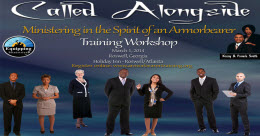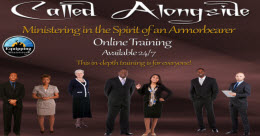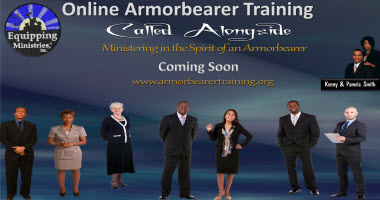









Check out upcoming workshops by clicking View Page
Find out how you can sponsor a workshop at your church. Click View Page for more information
We offer qualtiy online trainings that cover your entire church. Click View Page for more information
Find out about all the trainings we offer. Provide a short description of the image here. Click View Page for more information
Order the must thorough book available on armorbearing and other resources to help take your church to the next dimension. Click View Page for more information
[Library/component-nivo-slider-small/nivo-slider-small.htm]
Training for your entire church







We offer the most informative workshops on armorbearing. Your members will leave equipped, inspired, and ready to serve in their ministry roles.

Find out how to bring this impactful training to your church.

Can't come to a workshop? Then take our online classes. Coming Soon! Available 24/7. Pastors can even enroll a group to go through the class as a team.

All Things Church Administration - Be it the church secretary, church administrator, deacon, board member, pastor, treasurer, event coordinator, or other administrative staff you can get information and ask questions (www.churchadministrationblog.org). Click image to visit the website.

Coming in 2016 you will be able to receive armorbearer training online. This online training will allow us to provide a much more thorough training than what we can provide face-to-face due to time restraints. Click image to find out more.

Pamela Smith, our lead instructor, is known as the guru of church administration. She, along with other well-qualified teachers share their knowledge with you and your church's support staff. Click the image to find out about church administration certification programs and upcoming workshops.
Copyrighted Material from the book “Called Alongside – Ministering in the Spirit of an Armorbearer” by Pamela R Smith
And David came to Saul, and stood before him: and he loved him greatly; and he became his armourbearer. ~1 Samuel 16:21
Armorbearer is one of the most misunderstood, cause for tension among fellow members, and unfortunately abused role in some churches. Why? Because we don't understand that armorbearing is an attitude of the heart. In some churches I have seen people in the title of an "armorbearer" being abused and treated as houseboys/girls, frequently humiliated and taken advantage of to the point that it was clear we have failed to understand "ministering in the spirit of an armorbearer."
Coming soon we will launch our armorbearer blog so we can bring clarity and restore what it means to minister in the spirit of an armorbearer.
In the natural sense, an adjutant is one who helps a commanding officer with administrative affairs. The Online Etymology Dictionary defines an adjutant as a “military officer who assists superior officers.” It also defines it as, “one who helps, a helper, to give help, give strength, support.” According to Easton Bible Dictionary:
An armorbearer was an officer selected by generals and kings because of his bravery, not only to bear their armor but also to stand by them in the time of danger. They were the adjutants of our modern armies.
In the religious realm, an adjutant is one who helps, assists, and gives strength and support to pastoral leadership, his or her delegates, visiting ministers, and the vision and mission of the church. It is one who is able to consistently, willingly, be in place to be an aid to leadership and the vision of the church. This applies to all those serving in any ministerial capacity, from the parking attendant to the associate minister.
When we understand what it means to minister in the spirit of an armorbearer, we will no longer just throw people into positions in the church, but we will place them where there strengths and callings lie and we will wait on God to direct us. Many churches endure strife and church splits because they appoint talented, but spiritually and emotionally immature people to serve in leadership roles.
For example, did you know that ushers are leaders? In many churches they are the first contact your guests and members have upon entering the church on Sunday morning? They represent your church. When I see your usher, I see your church. Are your ushers skilled in their role and emotionally and spiritually mature enough to handle the role? Ushering can be challenging and it is not for everyone. How many potential members have you lost because of an usher with a bad disposition?
In order to flow effectively, an adjutant should not be a babe in the faith. Look at the original definition. It defines an adjutant as a “military officer who assists superior officers.” To qualify to be an adjutant, you must have a firm foundation. Officers are leaders and are trusted with assignments. Before I can sing in the choir, usher, work in the kitchen, serve in the nursery, etc., I must have firm biblical foundation. There are more fallouts in the choir, kitchen, and other departments where we place talent above calling and knowledge of God. Why? Often because we allow talented people to serve who have little root in the Word and they become easily offended (Mark 4:16–17). It takes more than talent to serve as an adjutant. You must also be called and have a biblical foundation before being released to serve.
And these are they likewise which are sown on stony ground; who, when they have heard the word, immediately receive it with gladness; And have no root in themselves, and so endure but for a time: afterward, when affliction or persecution ariseth for the word’s sake, immediately they are offended. ~ Mark 4:16-17
An adjutant must also have a loving relationship with God. He must be the center of attention and the motivating factor as to why one is serving. God alone is to be worshipped. Your love for God will help restrain you when you want to go off on someone. Your love for God will keep you committed to the assignment when you feel mistreated. Your love for God will help you stay focused on ministry.
Duties of an Adjutant/Armorbearer
You may ask, “What are my responsibilities and how do I fulfill them?” I am aware that churches have different roles for their armorbearers; however, it is important to be aware that I believe we all should possess the spirit of an armorbearer; therefore, my book addresses different roles and responsibilities from the church secretary to the minister of music and more.
Some churches have their armorbearers serving as “security guards.” Some even carry weapons. This book does not address “security-type armorbearers”, as it is my belief that security should fall under an established “Security Ministry” for the church. Security means risk management. It involves doing background checks on anyone who will be working with children or your church office and finances. It entails verifying references to avoid negligent hiring lawsuits.
The Security Ministry is well-trained, equipped, and endeavors to provide the congregation with a safe place to worship. “Safe Place” encompasses many things including your parking lot and other areas being well-lit, your entire facility being well-maintained, broken chairs thrown away, maintaining working fire-extinguishers, etc. Your Security Ministry must be knowledgeable of emergency procedures, accident prevention, facility management, etc. In biblical times, there were varying levels of ushers and some served as gatekeepers (equivalent to a Security Ministry). Even today, a number of churches have some of their ushers trained to serve within the “Security Ministry.” We believe it is best to tap into any police or trained security guards, military you have as members of your church to serve on your Security Ministry. In addition, ensure you are abiding by local and federal laws, so always seek professional advice prior to implementing a security team.